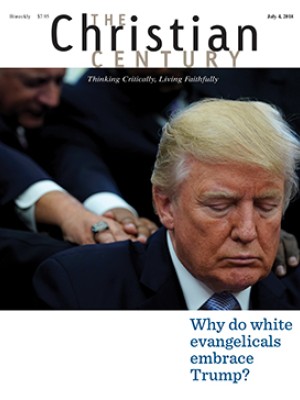Ireland's vote on abortion reveals deep divides
The referendum removing a restrictive consitutional clause was seen a gain for women’s empowerment—and another step toward social liberalization in Catholic Ireland.

(The Christian Science Monitor) When Irish prime minister Leo Varadkar announced a referendum that would relax one of the most restrictive regimes for abortion in Europe, his nod to women’s rights was clear.
“I believe this is a decision about whether we want to continue to stigmatize and criminalize our sisters, our co-workers, and our friends,” he said in January. “Or whether we are prepared to make a collective act of leadership to show empathy and compassion.”
Read our latest issue or browse back issues.
The referendum, which passed with 66.4 percent of those voting, was seen as another gain for women’s empowerment as well as the next step in a long process of social liberalization in Catholic Ireland. Varadkar himself is Ireland’s first—and one of the world’s few—openly gay heads of government. He came out as the country legalized same-sex marriage in 2015, the first country in the world to do so by popular vote.
[Catholic archbishop Eamon Martin of Armagh, Primate of All Ireland, told Vatican News that leaders of multiple Christian traditions had expressed concern about the referendum, advocating that “innocent human life should be protected.”]
But the mood surrounding the historic vote May 25 was more divisive than it was during other sociocultural shifts that have formed modern Ireland. Those against abortion saw opening access to it as a tragic betrayal of their faith and values. As for abortion rights activists, a history of state paternalism and misogyny weighed heavily, with many women questioning just how far they’d really come.
“It is about abortion, of course, but it is also about something more,” said Ailbhe Smyth, a longtime feminist and codirector of the Together for Yes campaign group. “It’s about the values of the kind of country that we want to have.”
Women are in revolt against the state’s historic mistreatment of women, she said. People’s opinions were shaped by their response to the use of symphysiotomy—a primitive form of obstetric surgery favored by doctors who opposed caesarean sections, some for religious reasons—and its scandal of unmarried mothers being sent to labor in Magdalene laundries.
“It’s the huge baggage that this referendum carries: how deeply oppressive this society has been, misogynistic if you like, particularly toward unmarried women and their babies,” Smyth said.
The vote repealed the so-called Eighth Amendment in the constitution, which gave equal rights to a pregnant woman and her unborn child, effectively prohibiting abortion unless a woman’s life is at risk. Proposed legislation following the yes vote would allow abortion on demand up to 12 weeks into pregnancy, and later in specific medical and psychiatric circumstances. Such a move would bring Ireland into line with most other European countries on this issue.
During the campaign, downtown Dublin was plastered with posters, many of them grim. People hurled insults. The atmosphere was a stark contrast to the atmosphere during the referendum on gay marriage, in which there was a sense among many of its opponents that approval of same-sex marriage was a foregone conclusion.
Abortion “has always been divisive; it will always be divisive,” says John McGuirk, spokesman for the antiabortion group Save the 8th.
In the yes camp, a central part of the narrative was stories of women deciding to terminate their pregnancies, many traveling abroad alone to do so. British Department of Health figures for 2016 show that 3,265 women with addresses in the Republic of Ireland obtained abortions in Britain that year. Actor and writer Tara Flynn is among the women who have gone public about their experiences.
“I felt it was a duty, in a way,” she said. “These are not mythological women [who have abortions], they are real women.”
The constitutional clause was not preventing abortions, she said, and “we can’t have a state with a lie in one of its foundational documents.”
The Eighth Amendment was enacted in 1983 in an effort to protect Ireland from the ramifications of Roe v. Wade in the United States. The recent campaign against the amendment dates to 2012 and the death of Savita Halappanavar, a 31-year-old pregnant woman who died from septic shock after being denied an abortion.
Despite the obvious divisions, even some who are ardently against abortion have conceded it is a complex issue. Eugene Murphy, a lawmaker in Fianna Fáil, usually considered to be the most antiabortion among the country’s mainstream parties, objected to the government’s stated plan to allow abortion on demand but also feels that abortions can be allowed for serious medical reasons. He wanted to repeal the provision in Ireland’s current law that allows for a sentence of up to 14 years imprisonment for “unlawful destruction of human life.”
“I have a problem with abortion at up to 12 weeks unrestricted,” he said. “Having said that, I have some reservations about some situations that are very, very difficult for women.”
A version of this article, which was edited on June 15, appears in the print edition under the title “Ireland vote on abortion reveals deep divides.”






